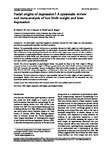Foetal origins of depression? A systematic review and meta-analysis of low birth weight and later depression
| dc.contributor.author | Wojcik, W | |
| dc.contributor.author | Lee, W | |
| dc.contributor.author | Colman, I | |
| dc.contributor.author | Hardy, R | |
| dc.contributor.author | Hotopf, M | |
| dc.contributor.author | others, | |
| dc.date.accessioned | 2017-05-18T14:50:50Z | |
| dc.date.available | 2017-05-18T14:50:50Z | |
| dc.date.issued | 2013 | |
| dc.identifier.issn | 0033-2917 | |
| dc.identifier.issn | 1469-8978 | |
| dc.identifier.other | 01 | |
| dc.identifier.uri | http://hdl.handle.net/10026.1/9284 | |
| dc.description.abstract |
Background The foetal origins hypothesis suggests an association between low birth weight and later depression, yet evidence supporting this association has been inconsistent. Method We systematically reviewed evidence for an association between low birth weight and adult depression or psychological distress in the general population by meta-analysis. We searched EMBASE, Medline, PsycINFO and ISI Web of Science for studies reporting observational data with low birth weight as the exposure and self- or clinician-rated depression or psychological distress measures as an outcome. Selective studies of exposures such as famine or outcomes such as severe illness only were excluded. Altogether,1454 studies were screened for relevance, 26 were included in the qualitative synthesis, 18 were included in the meta-analysis. A random effects meta-analysis method was used to obtain a pooled estimate of effect size. Results The odds of depression or psychological distress was greater for those of low birth weight (<2500 g) compared to those of normal birth weight (>2500 g) or greater [odds ratio (OR) 1.15, 95% confidence intervals (CI) 1.00–1.32]. However, this association became non-significant after trim-and-fill correction for publication bias (OR 1.08, 95% CI 0.92–1.27). Using meta-regression, no differences in effect size were observed by gender, outcome measure of depression or psychological distress, or whether the effect size was adjusted for possible confounders. Conclusions We found evidence to support a weak association between low birth weight and later depression or psychological distress, which may be due to publication bias. It remains possible that the association may vary according to severity of symptoms or other factors. | |
| dc.format.extent | 1-12 | |
| dc.format.medium | Print-Electronic | |
| dc.language | en | |
| dc.language.iso | en | |
| dc.publisher | Cambridge University Press | |
| dc.subject | Birth weight | |
| dc.subject | depression | |
| dc.subject | fetal origins | |
| dc.subject | psychological distress | |
| dc.title | Foetal origins of depression? A systematic review and meta-analysis of low birth weight and later depression | |
| dc.type | journal-article | |
| dc.type | article | |
| plymouth.author-url | https://www.ncbi.nlm.nih.gov/pubmed/22717127 | |
| plymouth.issue | 1 | |
| plymouth.volume | 43 | |
| plymouth.publication-status | Published | |
| plymouth.journal | Psychological medicine | |
| dc.identifier.doi | 10.1017/s0033291712000682 | |
| plymouth.organisational-group | /Plymouth | |
| plymouth.organisational-group | /Plymouth/REF 2021 Researchers by UoA | |
| plymouth.organisational-group | /Plymouth/REF 2021 Researchers by UoA/UoA03 Allied Health Professions, Dentistry, Nursing and Pharmacy | |
| plymouth.organisational-group | /Plymouth/Research Groups | |
| plymouth.organisational-group | /Plymouth/Research Groups/Institute of Translational and Stratified Medicine (ITSMED) | |
| plymouth.organisational-group | /Plymouth/Research Groups/Institute of Translational and Stratified Medicine (ITSMED)/CCT&PS | |
| dc.publisher.place | England | |
| dcterms.dateAccepted | 2012-01-01 | |
| dc.identifier.eissn | 1469-8978 | |
| dc.rights.embargoperiod | Not known | |
| rioxxterms.versionofrecord | 10.1017/s0033291712000682 | |
| rioxxterms.licenseref.uri | http://www.rioxx.net/licenses/all-rights-reserved | |
| rioxxterms.type | Journal Article/Review |


